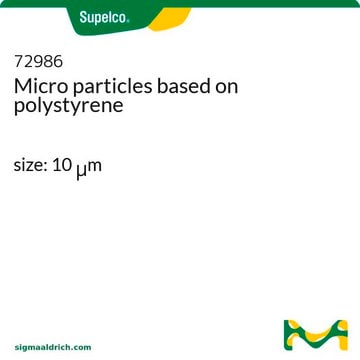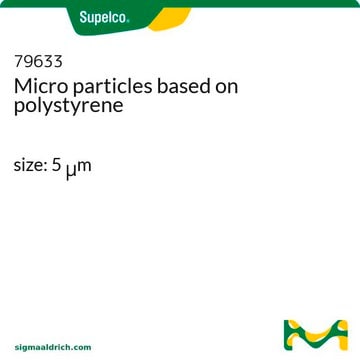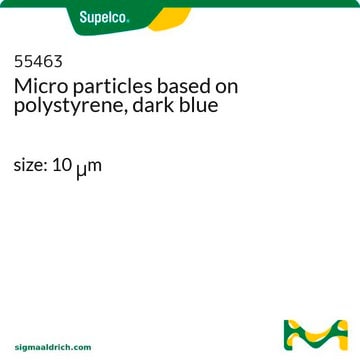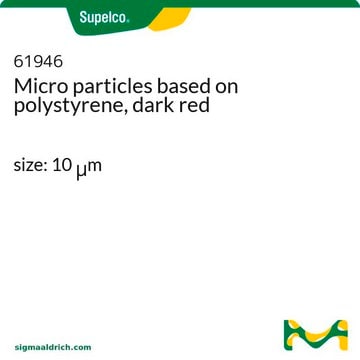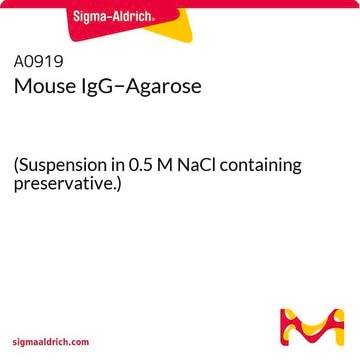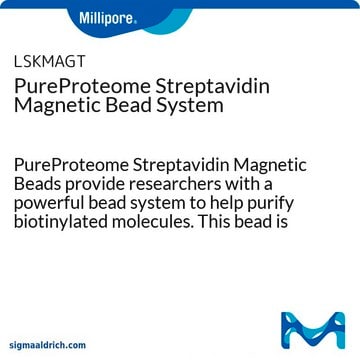49664
Micro particles based on polystyrene, magnetic
10 μm particle size, std dev <0.5 μm
Sinónimos:
Latex beads from PS, magnetic
Iniciar sesiónpara Ver la Fijación de precios por contrato y de la organización
About This Item
UNSPSC Code:
12352207
NACRES:
NA.54
Productos recomendados
form
aqueous solution
composition
iron oxide, ≥20%
concentration
5% solids
particle size
10 μm std dev <0.5 μm
storage temp.
2-8°C
¿Está buscando productos similares? Visita Guía de comparación de productos
General description
Superparamagnetic nanoparticles embedded in polystyrene microspheres (magnetic beads) play a vital role in cell separation and labeling. In addition, it is also used in various biomedical and bioengineering applications such as magnetic resonance imaging contrast enhancement, tissue repair, immunoassay, detoxification of biological fluids, hyperthermia, and drug delivery.
Magnetic polystyrene particles
Application
Micro particles based on polystyrene, magnetic has been used as magnetic biofilm carriers to separate and re-introduce microorganisms in a continuously stirred tank reactors (CSTR). It has also been used in magnetic microrheometry for measuring the cell-size-scale viscoelastic properties of stiffer 3D cell-culture matrices by micromanipulator experiments.
Storage Class
12 - Non Combustible Liquids
wgk_germany
nwg
flash_point_f
Not applicable
flash_point_c
Not applicable
ppe
Eyeshields, Gloves
Certificados de análisis (COA)
Busque Certificados de análisis (COA) introduciendo el número de lote del producto. Los números de lote se encuentran en la etiqueta del producto después de las palabras «Lot» o «Batch»
¿Ya tiene este producto?
Encuentre la documentación para los productos que ha comprado recientemente en la Biblioteca de documentos.
Los clientes también vieron
Juho Pokki et al.
Biomedical microdevices, 23(2), 27-27 (2021-04-27)
Changes in extracellular matrix stiffness impact a variety of biological processes including cancer progression. However, cells also actively remodel the matrices they interact with, dynamically altering the matrix mechanics they respond to. Further, cells not only react to matrix stiffness
Erdal C Oğuz et al.
Physical review letters, 124(23), 238003-238003 (2020-07-01)
Recovery of ground-state degeneracy in two-dimensional square ice is a significant challenge in the field of geometric frustration with far-reaching fundamental implications, such as realization of vertex models and understanding the effect of dimensionality reduction. We combine experiments, theory, and
Yau Kei Chan et al.
ACS applied materials & interfaces, 11(25), 22869-22877 (2019-05-31)
Cells in vitro usually require a solid scaffold to attach and form two-dimensional monolayer structures. To obtain a substrate-free cell monolayer, long culture time and specific detaching procedures are required. In this study, a thin-film-flow-induced strategy is reported to overcome
Nuestro equipo de científicos tiene experiencia en todas las áreas de investigación: Ciencias de la vida, Ciencia de los materiales, Síntesis química, Cromatografía, Analítica y muchas otras.
Póngase en contacto con el Servicio técnico